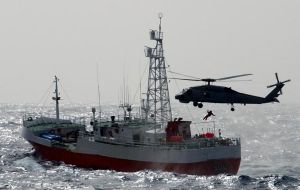MercoPress. South Atlantic News Agency
Benchmark Fishing Treaty Needs Nine More Ratifications to Become Active
 Brazil, Uruguay, Chile, EU and the US are among 16 countries that have signed treaty to deter Illegal, Unreported and Unregulated fishing
Brazil, Uruguay, Chile, EU and the US are among 16 countries that have signed treaty to deter Illegal, Unreported and Unregulated fishing Five more nations have signed the FAO-brokered treaty that once it enters into force will deny access to fishing ports to ships involved in illegal fishing. The new signatories include: Australia (27/04/2010), Gabon (26/04/2010), Peru (3/03/2010), New Zealand (15/12/2009) and the Russian Federation (29/04/2010).
This brings the number of countries that have signed the Agreement on Port State Measures to Prevent, Deter and Eliminate Illegal, Unreported and Unregulated Fishing to sixteen. Signatures represent a signal of support for the Agreement and are an important first step in the process, followed by ratification at the national level and then official notification of ratification to Food and Agriculture Organization (FAO).
Once notice of the 25th ratification is received by FAO, the Agreement will become active. It will be the first legally binding international treaty focused specifically on the problem of illegal, unreported and unregulated (IUU) fishing. It will also be the only such treaty to enlist so-called “non-flag states” in this effort alongside “flag states,” which are primarily responsible for the conduct of vessels flying their flags on the high seas.
Eleven other FAO members—Angola, Brazil, Chile, the European Community, Iceland, Indonesia, Norway, Samoa, Sierra Leone, the United States and Uruguay—signed the Agreement in November 2009, after its text was approved by the FAO governing conference.
“Once it becomes active, this will be the most significant international treaty dealing with fisheries since the 1995 UN Fish Stocks Agreement,” said Changchui He, FAO's Deputy Director-General, following the signing of the Agreement by Andrey Krainiy, Head of the Federal Agency for Fisheries of the Russian Federation, on April 29 during a ceremony at FAO.
“We take it as a very positive sign that the Russian Federation as well as other recent signatories such as Australia, Gabon, Peru, and New Zealand have come on board. It indicates a broad level of support. The sooner the treaty receives the required 25 ratifications to become active, the sooner countries will have a valuable new tool for combating illegal fishing,” he added.
“Port state measures” generally refer to actions taken to detect illegal fishing when ships come to port. This can include undertaking inspections of documentation, catches and equipment when boats land to take on fuel and supplies or offload fish, or requiring vessels to make activity reports before entering port. Vessels found to be involved in IUU fishing can be denied docking rights, causing considerable financial losses to their owners. Such measures are among the most-effective means of preventing the import, transhipment or laundering of illegally caught fish.




Top Comments
Disclaimer & comment rulesCommenting for this story is now closed.
If you have a Facebook account, become a fan and comment on our Facebook Page!